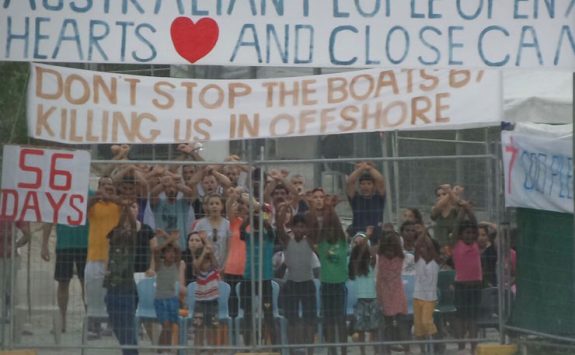Comedy without art (part 8)

By Dr George Venturini
When the newly chosen Senator Anning used his first speech to call for an end to Muslim immigration, he chose as the sum of his thoughts the words ‘final solution’. His party leader, Bob Katter of the Katter’s Australian Party, came out strongly in support of Anning, trying to reframe him as a man, who has not read history books, who never went to university, who never claimed to be anything more than what he was. “Are we racist?” Katter asked, defending the “solid gold” speech. “We’re Australians. I don’t know if that’s racist or not.” If Senator Anning can be excused for being ignorant, then one can explain the two words as a ‘malapropism’, the mistaken use of a word in place of a similar-sounding one, often with an amusing effect. Then one is back to the confusion of ‘dancing a flamingo’ instead of a flamenco.
It is almost numinous that the day after Sen. Anning’s speech, Dr. Mehreen Faruqi was elected as the first female Muslim senator in Australian history. Born in Pakistan, she immigrated to Australia in 1992, gained her doctorate in engineering and, later, became a member of the Greens. In joining the Senate, Faruqi gained another title, as the 100th woman to hold a seat in the upper house – truly a milestone which took 75 years to reach from the election of Australia’s first female senator, Dorothy Tangney, in 1943.
As The Saturday Paper editorialised for the occasion: “There is a tendency in Australia to look at our history as a measured march towards some inevitable, fairer ideal. To point out that every year since Dorothy Tangney’s election, on average, another woman or two has joined the Senate. That marriage equality was bound to happen. That new migrant groups will eventually find their place in the great project of Australian multiculturalism. To indulge in the magical thinking that things just get better.
The reality is that every step of progress in this country has been fought for, tooth and nail, and despite history’s affinity for rendering their leadership invisible, it has been disadvantaged minority communities that have started these movements for change. Often, they are inspired by a figure who was the first, by someone who could hear and understand the concerns of a community, because they themselves had lived them.” (‘Editorial,’ 100 women, The Saturday Paper, August 2018).
There are at least three areas which should agitate the conscience of every sentient person in Australia. They are, in no particular order of importance, the condition of women, the abuse of children, and the treatment of ‘The Other’ – the refugees.
Instead much time, attention and money is designated to deal with the problem of terrorism, which invariably is seen as coming from overseas. Australians have been there before: first there was the yellow peril, the name changed into the red peril and now comes the brown peril. Terrorism, or the menace thereof, always came and continues to come from abroad.
There is a certain theatrical element in all that: the foreignness of the actor/s, the choice of offensive weapons or means, the conspiratorial conditions which surround preparation and execution are the daily substance of the yellow press. All that becomes convenient material to increase the tension which often accompanies theatrical performances. The actors are ‘different’, fearful, foreign. They become the manna of miserable actors, the politicians which bank on promoting fear. There is a long history of the promotion of fear. One could think of John Howard, Pauline Hanson, Tony Abbott. One prefers not to think of Malcolm Turnbull, so urbane, classy, wealthy, living in a mansion in the costliest suburb of Sydney, and yet supporting the lugubrious speculations of Peter Dutton.
Nothing is said of the continuous and present danger which is the mistreatment of women. It does not ‘sale’, it is not ‘newsworthy’. That violence is ‘private’. Statistically it seems correct to say that at least one woman is killed every week at the hands of a current or former partner. But that is not like terrorism because it is not playable at the political table. Much attention is given, more often than not for short-term political purposes, to counter terrorism. Terrorism comes, invariably, from overseas – it is said. The fact of the matter is that domestic violence is a major threat, and one could venture saying that the training to kill – which is what the so-called Defence Force is – and the use of that force systematically and continuously as it has been made for the past fifteen years in overseas adventures (Afghanistan, Iraq, Syria and who knows where else) have presented a new generation with the consequences of the emotional dislocation caused by conflict. On returning home, too many veterans are often abandoned by the very government to solve by themselves the problem of generally called post-traumatic stress disorder, which is the product of a war condition. In that emotional dislocation is often the source of domestic violence.
Next comes the sexual abuse of children. On 15 December 2017 the Royal Commission into Institutional Responses to Child Sexual Abuse presented its final report. It dealt with the enormous work the Commission had done from its establishment, five years before, following revelations of child abusers being moved from place to place by their hosting institutions, instead of their abuse and crimes being reported. There were also revelations that adults failed to try to stop further acts of child abuse. The Commission examined the history of abuse in educational institutions, religious societies, sporting organisations, state institutions and youth organisations.
The serious work of the Commission was followed by the burlesque of the apology – which costs just about nothing, as that to the Indigenous People did, except for the survivors with their never ending tears; it was a travesty, a sick performance because behind the difficulties of compensation there is the cynical calculation that if the survivors of child sexual abuse die compensation will be ‘saved’.
The calculated delay in institutions joining the National Redress Scheme for institutional sexual abused survivors, which is the response to the Commission’s work and can be made any time before 30 June 2027, is a further betrayal and compounds the trauma endured.
The Scheme for institutional sexual abuse survivors started on 1 July 2018. Some 2,000 people have made applications. (P. McDonald, ‘Child sexual abuse survivor dies before redress approved; other terminally ill victims waiting,’ abc.net.au, 27 December 2018).
As at the middle of December 2018 only 20 survivors (1 per cent of the 2,000) have received any form of redress. Many of the applications received relate to institutions which have yet to come join the Scheme. Most Catholic church dioceses and archdioceses have joined the Scheme, but at least 150 Catholic orders, for one pretext or another, have yet to join. The Uniting church has yet to join the Scheme and the Anglican church has only partly done so. Neither the Catholic or Uniting churches have committed to a timeframe for fully joining the Scheme. The majority of Anglican church entities should join the scheme by the middle of 2019. (R. Llewellyn-Jones, ‘The survivors of child sexual abuse deserve compensation before they die,’ The Guardian, 20 December 2018).
In reality, the redress scheme is so deeply flawed that experienced lawyers find it frustrating. Allowing the Catholic church to opt out of the scheme mocks any notion of justice.
Now comes ‘The Other’. International responsibility-sharing for displaced people has completely collapsed. Rich countries are building walls against families fleeing war, at the same time as less money is available for aid to people in conflict areas. The number of people forced to flee reached 68.5 million at the start of 2018, according to figures from the United Nations High Commissioner for Refugees and Norwegian Refugee Council/Internal Displacement Monitoring Centre. This is almost three times as many people as there are living in Australia.
International cooperation and peace diplomacy are in deep crisis. The number of people displaced worldwide has increased for the sixth year in a row, and fewer people are safely returning home.
Forty million people are displaced within their own countries, and another 28.5 million have crossed a border and become refugees.
Turkey was the country which received most new refugees last year: 700,000 people. It now houses over 3.8 million refugees, most of them from Syria. In comparison, the rest of Europe as a whole received about half a million refugees last year, and the United States received about 60,000.
In 2017, 3.6 million sought protection in another country, either by themselves or through resettlement programmes. Turkey received close to 20 per cent of all new refugees in 2017, Bangladesh 18 per cent, Uganda 15 percent and Sudan 14 per cent.
When so few asylum seekers are arriving in Europe and the United States, governments should recognise the responsibility to increase their support to less rich countries which are currently hosting a large number of refugees, such as Bangladesh, Lebanon and Uganda, and increase the number of people received for resettlement. By May 2018 Uganda had only received 7.0 per cent of the money needed for United Nations and other organisations to be able to provide necessary support to the large number of refugees from South Sudan and the Democratic Republic of Congo. In Bangladesh the equivalent figure was 20 per cent.
In addition to economic support to countries receiving a large number of refugees, 1.2 million refugees need to be resettled in a new country, according to the U.N.H.C.R. These are persons who are not safe where they currently are. Last year the United Nations member countries only received about 103,000 resettlement refugees. (UNHCR – ‘Forced displacement at record 68.5 million,’ unhcr.org, by A. Edwards, 19 June 2018); see also: (J. Egeland, ‘Refugee Planet: A Record-Breaking 68 Million People Now Displaced by War and Persecution,’ towardfreedom.org, 25 June 2018).
Continued Wednesday – Comedy without art (part 9)
Previous instalment – Comedy without art (part 7)
 Dr. Venturino Giorgio Venturini devoted some seventy years to study, practice, teach, write and administer law at different places in four continents. He may be reached at George.venturini@bigpond.com.au.
Dr. Venturino Giorgio Venturini devoted some seventy years to study, practice, teach, write and administer law at different places in four continents. He may be reached at George.venturini@bigpond.com.au.
Like what we do at The AIMN?
You’ll like it even more knowing that your donation will help us to keep up the good fight.
Chuck in a few bucks and see just how far it goes!










2 comments
Login here Register here-
-
Phil Pryor
Return to home pagePingback: Comedy without art (part 8) #newsoz.org #auspol - News Oz
Democracy and/or parliamentary systems offer unscrupulous exploiters a road to career, wealth, prestige, vainglorious pose, security. By organising and renting votes, patrons, donors, overseers, politicians especially, the success in a vote leads to getting the keys to money, law, administration, regulation, policy, weapons, reins of control. Most punters spend five minutes on the vote, less in thinking about it, and a little irritation in making the effort. Side doors allow some unwiped anus like Anning to get in and mouth off. Senate positions in Australia, of some marginal importance at times (Harradine, Lambie) can be the core for perversion, distortion, corruption. As they say in Venice, Far Canal! The whole process is an alimentary canal of political ingredients, leading to a great faecal expulsion. And, with a Head Moron of distorted superstition and primitive processes of grubby intellect (HAH) backed by a government team of rejects from the school of Bad Drama, we are furrily thucked.